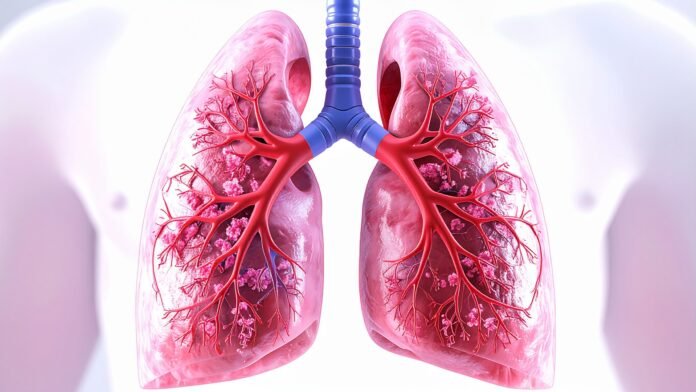Chinese researchers have made exciting progress in treating small-cell lung cancer (SCLC), a tough and fast-spreading type of lung cancer. In a groundbreaking first-in-human trial, they’ve tested a new antibody drug called SHR-4849, which shows promise for patients whose SCLC has relapsed and who have few treatment options left.
SCLC is one of the most aggressive forms of lung cancer, with limited therapies and a challenging outlook for patients. According to the International Agency for Research on Cancer, around 2.48 million people worldwide were diagnosed with lung cancer in 2022. Out of these, SCLC affected about 11.5% of men and 9.7% of women. That’s why breakthroughs like this new DLL3-targeted therapy could change lives for those battling relapsed SCLC.
The Phase I study focused on SHR-4849, an antibody-drug conjugate (ADC) that homes in on DLL3, a protein highly expressed in SCLC tumors. This drug combines a humanized anti-DLL3 antibody with a potent DNA topoisomerase I inhibitor, connected by a cleavable linker, making it a targeted treatment for SCLC patients with relapsed disease.
Led by Dr. Linlin Wang from the Affiliated Cancer Hospital of Shandong First Medical University, the team treated 54 patients with relapsed SCLC. They used five different dose levels, from 0.8 to 4.2 mg/kg, in a dose-escalation and expansion trial. The results? Impressive! Among 42 patients whose responses could be evaluated, the objective response rate (ORR) hit 59.5%, meaning more than half saw their tumors shrink or disappear. The disease control rate (DCR) was even higher at 90.5%, showing the drug kept cancer in check for most.
For patients followed for at least 12 weeks, the ORR jumped to 69.2%. At the 2.4 mg/kg expansion dose, it reached a stunning 77.8%. These early signs of anti-tumor activity in relapsed SCLC patients are a big deal, especially since SCLC treatment options are so limited.
Safety looks good too. The most common side effects were things like low white blood cell count, anemia, neutropenia, and nausea. Importantly, no one had to stop treatment due to side effects, and there were no deaths linked to the drug. Researchers saw no dose-limiting toxicities below 4.2 mg/kg, and the free toxin levels in the blood stayed low across all doses.
Dr. Wang and her team are thrilled with these findings. “These encouraging early data support further investigation of SHR-4849 as a potential treatment for patients with DLL3-positive relapsed SCLC,” she said. The trial is now moving into dose expansion to find the best dose for Phase II studies, aiming to confirm SHR-4849’s role as a game-changer for DLL3-expressing SCLC.
The team shared these results at the International Association for the Study of Lung Cancer 2025 World Conference on Lung Cancer (WCLC), sparking hope for better SCLC therapies worldwide. If you’re searching for updates on lung cancer treatment or relapsed SCLC options, this DLL3-targeted ADC could be the next big step forward.



